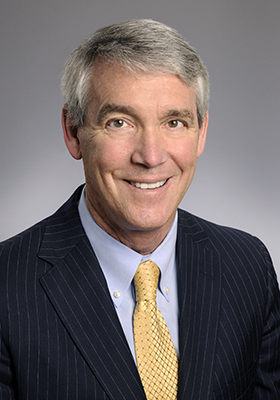Voices of U of U Health
Stopping Stigma, Saving Lives
This fall, the largest-ever gathering of advocates working to end stigma around mental health and substance use disorders took place in Utah.
The Huntsman Mental Health Institute (HMHI) hosted the Stop Stigma Design Summit. The summit included 135 advocacy organizations from across the country.
Why now? Because this is a time of urgency. If we do nothing, the mental health and substance use problems heightened by COVID-19 will only get worse.
The diversity of voices at this unique event enabled a deep discussion about stigma. We considered societal and institutional factors. These conversations represent the initial steps in a national engagement process.
Four out of 10 Americans suffer from symptoms of anxiety or depression. The rate of suicide and drug and alcohol use is going up. The number of children experiencing mental health challenges is also on the rise.
These are disorders of the brain—not personality flaws or character weaknesses. They are as real as heart disease and cancer.
But so many people fear judgment of their disorder that they don’t seek the help they need.
As we look at our nation’s history, we know that can change.
Learning from the Past
There was a time when people didn’t wear seatbelts. But after years of public education campaigns, wearing a seatbelt has become the norm.
There was a time when people didn’t talk about breast cancer. But today, it's a different story. Everyone from celebrities to our neighbors discuss their diagnoses and advocate for breast cancer research.
We know mental health and substance use disorders are the greatest cause of disability in the world. Many people with these disorders struggle to show up to work. They don’t follow up with treatment. And other health conditions, such as diabetes, may also go untreated.
They’re less likely to exercise, control their diet, and take their medication.
The evidence is clear: untreated mental health and substance use disorders can lead to an avalanche of other problems. That impacts not only the individual, but society at large.
Even if it takes decades, we can change people’s perception of mental health and substance use disorders. We want to end the stigma and shame that can lead to years of lack of treatment.

The Power of Collaboration
Until now, no organization has been willing to step up as the backbone for what we call a Grand Challenge. This is a social change movement that tries to affect both attitudes and behavior.
The Huntsman Mental Health Institute is taking the lead.
The first step was this historic gathering of 135 organizations last month. The summit gathered large groups like the American Psychiatric Association and the National Alliance on Mental Illness alongside smaller organizations, including:
- Silence the Shame, started by music industry executive Shanti Das.
- Dragonfly Mental Health, which serves the academic community.
- The Jed Foundation, which helps teens and young adults—including those at the University of Utah.
- A variety of organizations supporting the mental health of BIPOC and LGBTQ+ communities, including Utah-based Encircle.
- The Ad Council, a nonprofit that creates public service announcements, shared their recent work with us—including their COVID-19 vaccine campaign.
We talked strategy and asked the various groups about tools and training that would be useful to them.
A Common Agenda
While HMHI is the backbone of this Grand Challenge, we want to engage these organizations to develop a common agenda for this 10-year-plus effort.
Two future summits will focus on media—and not only social media, but traditional journalism, entertainment, and the growing concern about children’s mental health. We plan to hold both of those summits within the next 12 months.
Tackling big, complex problems cannot be done alone. So many smart people are already committed to eliminating stigma. Yet all these organizations are performing as soloists.
We want to orchestrate the symphony.
Accelerating Change
We recently announced a five-year, $15 million partnership between HMHI and the Ad Council. We are harnessing their expertise to develop public service announcements and media campaigns. These campaigns will educate Americans about the realities of mental health and substance use issues. We hope that more education will save more lives.
A Commitment at Home
Senior leadership at the University of Utah are committed to tackling tough problems. That’s one reason why I wanted to come to HMHI.
The U is the only member of the Association of American Universities placing such a high priority on mental health. HMHI has committed $21 million over three years to make the Stop Stigma initiative a success.
In addition to this national movement, HMHI is leading efforts to end mental health and substance use disorders in Utah. We invite all who are interested to join us.

Now More than Ever
Years ago, I had a patient who suffered severe whiplash in a car accident. The emergency room physician was extremely attentive until he learned the patient was being treated for depression.
At that point, he dismissed her concerns and sent her home. Stories like this are all too common.
Most hospitals and health systems have decreased the number of psychiatric beds. But the need for care is only increasing. If we do nothing, suicides and overdose deaths will increase. Children’s mental health will get worse.
Our society will shoulder that burden as more adults end up either in the emergency room, unable to work, or homeless. If we change people’s minds about mental health and substance use disorders, all that can change.
The time for action is now.
